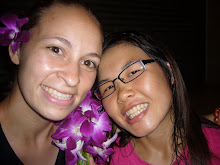This apple pie was the first for some students.
No one wanted to learn English at our informal dorm class, so we baked snacks instead. It began with lemon bars, actually, lime bars because lemons are hard to find here. While we were preparing them, B came up and wanted to help. As we were mixing together the egg, sugar, and lemon juice, B pondered, "I've always wanted to make a pie"
"Sure, we can do that sometime." I responded. "I love making pie, and my grandma even sent me here with a pie pan."
"What kind of pie can we make?" B asked.
"Well, pumpkin or apple would probably be easiest but whatever you want." I suggested.
B continued, "Well, I think I'd like to make an apple pie."
"OK, that will be fun."
We kept working on the lemon bars, then B asked, "Can I borrow some of your flour?"
"Sure."
"Great. What else do we need?" He asked.
"To make an apple pie? You want to make it now?"
"Yes, I'll go to the market and get apples, those bright green ones, right? Anything else?"

As B left for the market, I laughed to myself. In the States we probably would have asked each other about our schedules and found an afternoon when we were free to make pie, but here the concept of 'schedule' is a lot more fluid. If we want to do something now, we'll do it. If we have a meeting scheduled, we'll try to be there, but if something comes up, it's no big deal. If we have English class scheduled, we'll go, unless we need to do laundry, study another subject, or go to the post office. Lesson #1: Use your schedule as an outline for the day but be flexible and don't get frustrated when plans are changed.
When B got back from the market, he was carrying a bag of red apples. So we made pie with red apples instead of green, sour ones. When it came time for rolling out the crust we all looked around for something that would work for a rolling pin. After turning down a bottle with ridges and a flimsy cup, we settled on a small, smooth bottle of vanilla. It worked fine. Lesson #2: Be creative and resourceful. If limes are abundant and lemons expensive, replace limes for the lemons in your recipe.
Lesson #3: Relax and slow down. If the recipe says to bake it for 30 minutes, but it takes a hour in your oven, it will still taste good. If the cup of flour isn't completely leveled off because your helper doesn't know it matters, the bread will still turn out. If you have to make lime zest by cutting off the rind with a knife then dicing the rind for 10 minutes to make it small enough, use the time to learn words like knife and lime.

Lesson #4: Don't worry! It most likely will turn out okay, and if it doesn't, you can try again another day. When I started to worry about something turning out right, like my lime bars, I had to stop and remind myself that none of these students have ever had a lime bar before. They won't know the difference if the filling has green specks from the rind, or if I have no powdered sugar to sprinkle on top. They will enjoy tasting something new, and if anyone doesn't like it, that just leaves more for the rest of us!
Enjoying the last crumbs!





love it Julia. we share stories about what the Lord is doing in your life over there often, and pray for you often as well. Be encouraged and blessed.
ReplyDelete